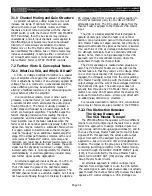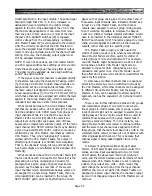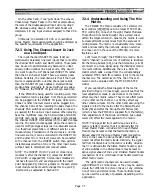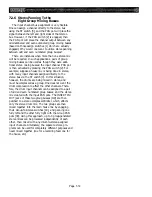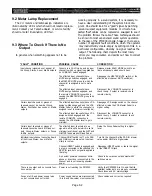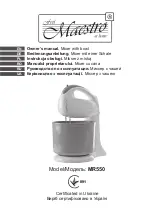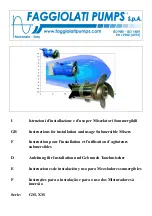
8.2.2 The Mix Matrix Allows the 8 Groups
Plus the Stereo Bus to Function as
10 Subgroups.
It is relatively straightforward to use the mix matrix
to create up to eight mono outputs or four stereo out-
puts from the eight subgroups and the stereo bus.
However, it is equally easy to use the stereo bus not to
create a stereo mix, but instead to create two additional
subgroups. In this case, use the “L” side of the stereo
bus for one group, and the “R” side for another group.
Engage the direct-to-STereo assign switch [3] on any
channels you wish to assign to either of these groups,
and turn the channel PAN pot [2] fully to one side or the
other to select the “L” or “R” bus. The two Stereo Master
Faders [58] then act exactly like each of the Group
Master Faders [42]. The GROUP-TO-ST switches [40]
should not be engaged here. Each channel of the mix
matrix can then be used to mix the Stereo L & R, and
Groups 1 through 8 down to a single output, producing
the desired 10:1 mix. Depending on how you adjust the
matrix, this can create eight mono mixes, four stereo
mixes, or some combination thereof.
8.2.3 How To Get 5 Independent Stereo
Mixes or 10 Mono Mixes by Using
the Stereo Bus Plus the Mix Matrix.
This application requires that the console’s internal
jumper switches be reset so that the Group-to-Mtrx
feeds are derived pre-Group Master Fader (see Section
6.12). The eight Group Master Faders [42] may then be
assigned to the Stereo Master Faders [58] by engaging
the Group-to-ST switches [40]. In this case, the Group
Master Faders function as subgroup controls for the
overall mixed output controlled by the Stereo Master
Faders. These outputs can be used for a stereo program,
or for two mono program feeds, depending on the way
the Group PAN controls [39] are set. At the same time,
the Group busses are assigned to the mix matrix via the
Group-to-MTRX switches [41]. The 8 groups can then be
mixed as required into pairs or individual matrix
channels using the #1 to #8 Matrix Mix Level Controls
[30] for “subgrouping,” and using the corresponding
MTRX MASTER controls [31] as mono or stereo mas-
ters for those mixes. Be sure that the STEREO-TO-
MTRX switch [54] on the Stereo Module is disengaged
to avoid interaction with the discrete mix(es) for the
Figure 8-2. System Diagram with Mix Matrix Providing 8 Mono or 4 Stereo Outputs From 10 Subgroups
Stereo Master Fader outputs. Given a total of eight
matrix channels, this means that four stereo mixes or
eight mono mixes can be created with the matrix. Since
these mixes are not affected by the Group or Stereo
Master Faders, the eight MTRX OUT connectors [131]
plus the two STEREO OUT connectors [133] can
provide a total of five discrete stereo mixes or 10 mono
mixes derived from the same eight Group busses.
Page 8-4
Summary of Contents for PM4000
Page 1: ...PROFESSIONAL AUDIO MIXING CONSOLE PM4000 OPERATING MANUAL YAMAHA ...
Page 2: ...PM4000 OPERATING MANUAL ...
Page 7: ...Section 1 Introduction ...
Page 11: ...Section 2 Brief Operating Instruction ...
Page 47: ...Section 3 Specifications ...
Page 51: ...Dimensional Drawings PM4000 Console all versions Page 3 4 ...
Page 52: ...Page 3 5 ...
Page 53: ...Page 3 6 PM4000 Console Rear Profiles ...
Page 54: ...Module Block Diagrams See back of the manual for overall system block diagram Page 3 7 ...
Page 55: ...Page 3 8 ...
Page 56: ...Page 3 9 ...
Page 57: ...Page 3 10 ...
Page 58: ...Page 3 11 ...
Page 59: ...Page 3 12 ...
Page 60: ...Section 4 Installation Notes ...
Page 72: ...Figure 4 13 Cables For Use With Balanced Sources Page 4 12 ...
Page 79: ...SECTION 5 Gain Structure and Levels ...
Page 82: ...Figure 5 1 Dynamic Range and Headroom in Sound Systems Page 5 3 ...
Page 86: ...Section 6 Optional Functions ...
Page 106: ...Section 7 Operating Notes and Hints ...
Page 119: ...Section 8 Applications ...
Page 127: ...Section 9 Maintenance ...
Page 131: ......
Page 132: ...YAMAHA VN02300 ...


